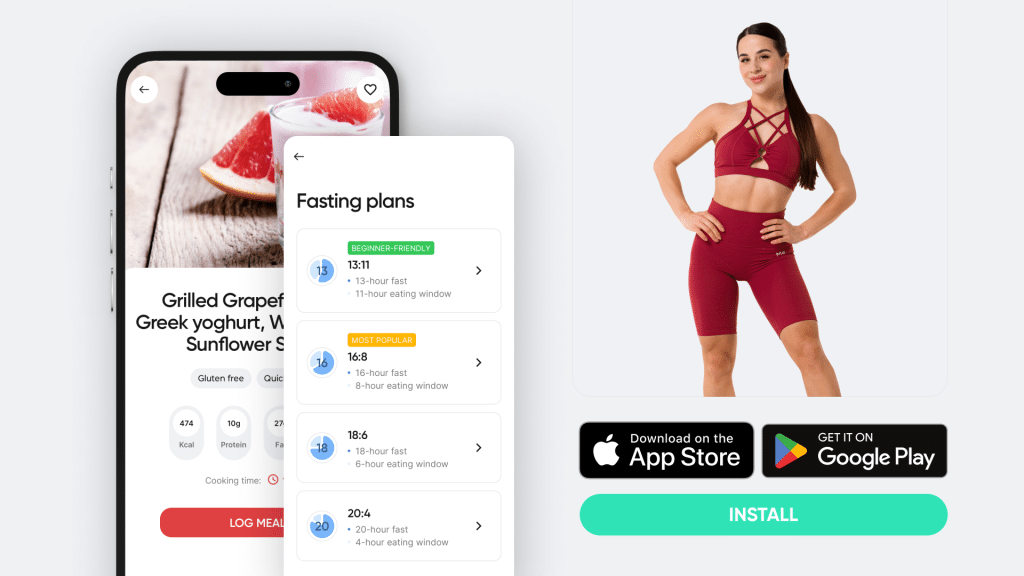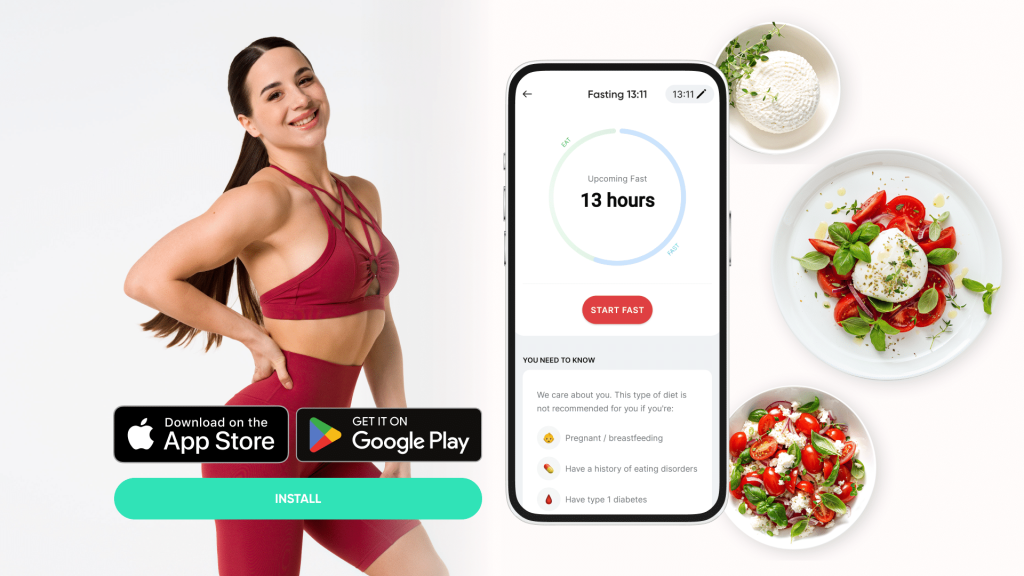Ah, coffee. The perfect way to start your morning…especially when you’re on an intermittent fasting diet. Not only does a good cup of joe help wake you up and jumpstart your day, but it can also provide some benefits to your fasting by providing an energy boost without breaking the fast. But not all coffee is created equal. And if you’re looking to maximize the benefits of your intermittent fasting coffee, there are some important factors you should consider. Here are 7 tips for making the perfect cup of intermittent fasting coffee.
Can You Drink Coffee When Intermittent Fasting?
The short answer is yes. Coffee can be consumed during fasting as long as your version does not contain added sweeteners, creamers, or other additives with calories.
If you’re adding any of these ingredients to your coffee, then it will likely break the fast and could have an effect on your intermittent fasting goals.
Drinking black, unsweetened coffee during your fasting window may help you reap the following benefits:
Improved Alertness And Focus
Research has shown that caffeine can help improve alertness, focus and time-on-task performance (4). This could be especially useful if your fasting window happens to be during the morning hours when you need to stay focused on work tasks.
Decreased Hunger Levels
Coffee might help stave off hunger pangs and aid in the process of fasting. While it won’t completely take away hunger, it may make for a smoother transition into your fasted state. The mechanism is thought to be related to the effects of caffeine on hormones such as ghrelin, which is involved in regulating hunger (5).
Improved Metabolism
Caffeine may help increase energy levels and metabolism, resulting in improved fat-burning over time (7). This can aid in optimal body composition when combined with a healthy diet and exercise program.
The mechanism is thought to be related to the role of caffeine in encouraging the release of fatty acids from fat cells.
Improved Energy And Endurance
Caffeine can help improve performance during extended periods of exercise. This can be especially beneficial for those looking to incorporate more physical activity into their routine while fasting. The mechanism is thought to be related to the role of caffeine in decreasing levels of perceived exertion and increasing adrenaline levels.
Decreased Inflammation
Coffee may help reduce levels of inflammation, which can be a beneficial outcome for those with chronic conditions or elevated inflammatory markers (6). The mechanism is thought to be related to the role of phytochemicals in coffee in decreasing levels of pro-inflammatory molecules.
Read More: Intermittent Fasting Exercise For Safe Weight Loss And Muscle Preservation
How To Drink Coffee During Intermittent Fasting
There’s a right and wrong way to drink coffee when you’re following an intermittent fasting diet. Here are the key tips to follow:
1. Limit It To One Cup Per Day
The recommendation for coffee consumption is up to 400 milligrams (mg) of caffeine per day (8). That’s about four cups of brewed coffee. However, drinking too much can have negative effects. Especially when combined with the lack of calories during intermittent fasting.
Consuming more than 500-600 mg daily may lead to side effects such as nervousness, irritability, restlessness, insomnia, increased heart rate or muscle tremors (1). These effects can be attributed to the high levels of caffeine in coffee, which is a stimulant.
Coffee can also increase the amount of acid in your stomach and may lead to heartburn or upset stomach. Additionally, if you’re sensitive to caffeine or consume too much, it can cause headaches, dizziness, and dehydration.
In some cases, drinking too much coffee leads to anxiety or panic attacks.
2. Drink It Early, Not Late
The half-life of caffeine is approximately six hours (2). This means that if you drink a cup of coffee in the morning it will be mostly out of your system by late afternoon. Assuming your fasting window is in the evening, drinking coffee too late can interfere with sleep and lead to restlessness.
Additionally, having your cup of coffee early in the day will also help you reap the most benefits as it can provide an increase in alertness and focus.
3. Keep It Black
When drinking coffee during intermittent fasting, it’s best to keep it as simple as possible. This means limiting added sugars, syrups, or creamers. Artificial sweeteners should also be avoided as they may have negative effects on appetite and hunger levels which can interfere with the fasting process.
Adding milk or cream will also break your fast, as these both contain calories.
4. Add MCT Oil
MCT (medium chain triglyceride) oil can be a great addition to coffee during intermittent fasting. It’s a type of saturated fatty acid that gets metabolized quickly and can provide a quick source of energy.
It has also been linked with improved mental clarity, focus, and alertness. Additionally, adding MCT oil can help promote a feeling of satiety and fullness – making it easier to stay in the fasting window.
Keto dieters are especially fond of adding MCT oil to their coffee. That’s because they believe it helps to increase ketone levels and can help promote fat burning (10). While not everyone needs to follow a keto diet or even use MCT oil, it can be beneficial for those looking to stay in the fasting window and reap the benefits of intermittent fasting.
Want to build an attention-grabbing bubble butt, blast away fat that’s stored in all the wrong places, spring-clean your diet, turn back the clock on your skin, skyrocket your self-confidence and shatter your insecurities? Check out the BetterMe app and set this plan in motion!
5. Add Clarified Butter
Clarified butter, also known as ghee, is another great addition to coffee during intermittent fasting. Adding it can help provide a source of energy, as well as improve cognitive performance due to the combination of healthy fats and vitamins A, D, E and K.
Butter has calories, so technically it will break your fast. However, they’re probably not enough to cause a “feeding” response. This means there won’t be any insulin spike, so you’ll still be able to reap the benefits of intermittent fasting.
6. Drink Decaf
If you’re caffeine-sensitive or just don’t want the added stimulation, decaffeinated coffee is an option. There are various types of decaffeinated coffee, including water process, carbon dioxide process, and Swiss water process.
Decaf still contains some caffeine, but much less than regular coffee. Caffeine-sensitive individuals may also want to opt for herbal teas during their fasting window.
7. Hydrate
Coffee is a diuretic. This means it can increase water loss and lead to dehydration if too much is consumed. Therefore, it’s important to drink plenty of water when drinking coffee during intermittent fasting.
The general recommendation is to drink 8-10 glasses of water per day(9). Additionally, electrolytes are important for optimal hydration – so consider adding a pinch of sea salt to your water.
Sea salt is unrefined salt from the sea. It contains trace minerals and electrolytes that are beneficial for hydration, such as magnesium, calcium, and potassium.
Adding a pinch to your water can help improve hydration and prevent dehydration when drinking coffee during intermittent fasting.
Himalayan salt is another type of unrefined salt that’s also beneficial for hydration and can be added to water during intermittent fasting.
Read More: Fasting Detox: Foods And Drinks To Detoxify Your Body Safely
Intermittent Fasting Coffee FAQs
Q: Can I Drink Intermittent Fasting Coffee With Milk?
A: No, adding milk or cream will break your fast, as these both contain calories. Stick with black coffee during intermittent fasting.
Q: Is Intermittent Fasting Coffee Bad For You?
A: Generally speaking, no. Coffee has many potential health benefits and can be a great addition to your intermittent fasting routine. However, some people may be sensitive to the effects of caffeine – so proceed with caution if you are.
Q: Can I Add Sweeteners To Intermittent Fasting Coffee?
A: No, sweeteners contain calories and will break your fast. Even natural sweeteners like maple syrup, honey and agave should be avoided during intermittent fasting. Stick with black coffee or add a calorie-free sweetener.
Q: Is Intermittent Fasting Coffee Good For Weight Loss?
A: While coffee may not directly promote weight loss, it can be beneficial for those looking to achieve a calorie deficit. Coffee might help reduce hunger and cravings – making it easier to stay in the fasting window and consume fewer calories.
Q: What Are The Best Types Of Coffee For Intermittent Fasting?
A: Any type of coffee – regular or decaf – can be consumed during intermittent fasting. Just make sure it’s black and doesn’t contain any added calories. Adding a little MCT oil, clarified butter, or a calorie-free sweetener is also an option.
When it comes to weight loss, progress is made by inches, not miles, so it’s much harder to track and a lot easier to give up. BetterMe app is your personal trainer, nutritionist and support system all in one. Start using our app to stay on track and hold yourself accountable!
Conclusion
Drinking coffee during intermittent fasting can provide many benefits, such as improved focus and energy levels. However, it’s important to drink it at the right time and in moderation. Aim for one cup per day, preferably early in the day.
Avoid adding creamers or sweeteners as these can break the fast and interfere with your progress. MCT oil can be a great way to increase energy levels while still maintaining ketosis. Ultimately, be sure to listen to your body and how it responds to caffeine so that you can adjust your intake accordingly.
DISCLAIMER:
This article is intended for general informational purposes only and does not serve to address individual circumstances. It is not a substitute for professional advice or help and should not be relied on for making any kind of decision-making. Any action taken as a direct or indirect result of the information in this article is entirely at your own risk and is your sole responsibility.
BetterMe, its content staff, and its medical advisors accept no responsibility for inaccuracies, errors, misstatements, inconsistencies, or omissions and specifically disclaim any liability, loss or risk, personal, professional or otherwise, which may be incurred as a consequence, directly or indirectly, of the use and/or application of any content.
You should always seek the advice of your physician or other qualified health provider with any questions you may have regarding a medical condition or your specific situation. Never disregard professional medical advice or delay seeking it because of BetterMe content. If you suspect or think you may have a medical emergency, call your doctor.
SOURCES:
- Are You Getting Too Much Caffeine? (2023, consumerreports.org)
- Caffeine & Sleep: How Long Does Caffeine Keep You Awake? (2021, houstonmethodist.org)
- Caffeine (2022, gov.au)
- Caffeine and mental alertness – part 1 (2021, coffeeandhealth.org)
- Caffeine, coffee, and appetite control: a review (2017, nih.gov)
- Consumption of coffee or caffeine and serum concentration of inflammatory markers: A systematic review (2019, nih.gov)
- expert reaction to study looking at blood caffeine level and body fat / type 2 diabetes (2023, science media centre.org)
- Nutrition and healthy eating Print (2022, mayoclinic.org)
- Water, drinks and your health (2019, nhs.uk)
- Weight-loss diet that includes consumption of medium-chain triacylglycerol oil leads to a greater rate of weight and fat mass loss than does olive oil 2 (2010, nih.gov)










